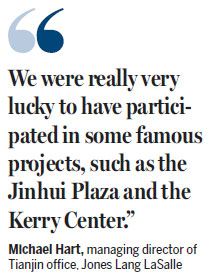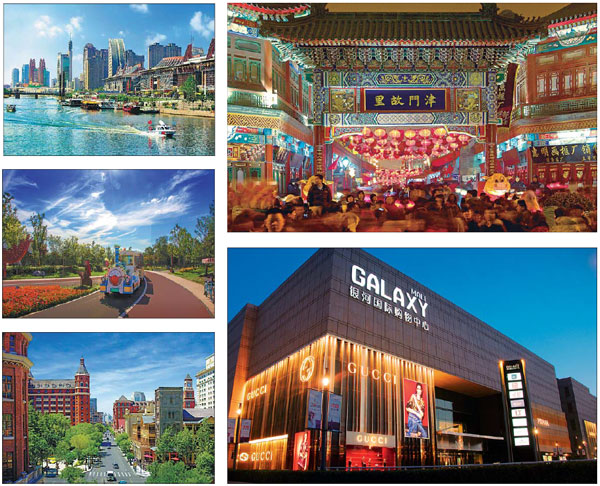Foreigners flock to growing metropolis
|
Thanks to the improvements in living and business environment, an increasing number of foreigners have chosen to live and work in the city. |
Tianjin has seen great improvements in recent years in terms of its overall living conditions and business environment, which has led to an increase in the number of foreigners choosing to live and work in the city.
Michael Hart from the United States is one of them. He is managing director of Jones Lang LaSalle's Tianjin branch, and said that he has been happy to witness the changes in the city during his nine years there.
Hart's company is one of the world's five major real estate consulting agencies, and he said its decision to open a branch in Tianjin in November 2006 indicated its confidence in the city's future. Hart added that he saw the opening of the branch as a rare chance to establish his own team and get to know a new city. After moving to Tianjin with his family and joining the local US Chamber of Commerce, he found that for the first few years, he missed some of the things he had come to take for granted during the time he spent living in Taipei and Shanghai.
"There were limited choices for restaurants and entertainment and the chamber of commerce held only one event per month," he explained.
But over the years, Tianjin grew and changed rapidly.

"The government has invested a great deal in infrastructure in recent years, so the development in transport alone is surprising enough, then the airport and railway station got revamped, and several subways and a south station were built," he said. "It's becoming more convenient for my friends in Beijing to visit me. They tell me they'd like to stay in a fancy Tianjin hotel and enjoy a cozy weekend away from the tumultuous capital."
Hart said he loves to take friends to places with an exotic atmosphere, such as Minyuan Stadium, Wudadao (or Five Avenues) and Italian-style Street, because "being there makes me feel that I'm back in my hometown and making new friends."
He added that he is satisfied with both the convenience of life and his company's continuous growth in recent years. Jones Lang LaSalle's Tianjin branch provides the same services as its Shanghai and Beijing counterparts, including property management, office space leasing, retail and industrial warehousing, and counseling. Last year, it began helping Chinese citizens that wanted to buy properties in foreign countries.
"Few potential clients understood what are the professional services in the real estate industry in the first years and the company was not well known to locals until our team cooperated with some Tianjin property developers, tenants and the government," Hart said. "We were really very lucky to have participated in some famous projects, such as the Jinhui Plaza and the Kerry Center. These projects all helped us grow."
Hart's team, which initially only had four members, now numbers more than 60, and he noted that they are now planning to serve cities outside of Tianjin, such as Tangshan and Shijiazhuang in neighboring Hebei province.
Hart commented that although Tianjin's services industry has developed rapidly, manufacturing is still the dominant sector in the city. It is this powerful manufacturing foundation, however, that has seen Tianjin attract such industrial giants as Otis, Samsung, Toyota and Volkswagen. As well as this there are the pharmaceutical, petrochemical and electronics industries, and a solid foundation in aerospace, thanks to the operations of Airbus, Boeing, Rockwell Collins and China Aviation Industry Corp.
Hart added that the city is also very suitable for family life, and his two children have received an excellent education there. On top of this, dining and shopping options in Tianjin have increased in recent years, with Galaxy Mall, Joy City and Kerry Center all contributing to its atmosphere and livability.
"In good weather, I like to enjoy some food along the Haihe River while appreciating the scenery. In winter, we can let the kids ski and skate in downtown Tianjin. Although the air quality here could be somewhat improved, the city can be proud of its affordability and livability," he said.
The levels of urban planning, building, and management also affect the overall quality of life in the city. In its ranking of 140 cities around the world by livability and living conditions for 2015, the Economist Intelligence Unit placed Tianjin 70th, one place behind Beijing and one ahead of Suzhou. The ranking took into account difficulties individuals may encounter in these cities and more than 30 other factors in five major areas: Stability, medical care, culture and environment, education, and infrastructure.
According to its 13th Five-Year Plan (2016-20), Tianjin aims to have a green coverage of 40 percent and a garbage treatment rate of 98 percent by 2020. It will continue work on its downtown and Binhai New Area, airports and harbors and promote increasing integration with neighboring Beijing and Hebei province.
Its aim is to develop a fully modern, livable and smart metropolis.
zhangmin@chinadaily.com.cn
|
The group of pictures show Tianjin's various attraction, both modern and traditional. |
(China Daily 06/25/2016 page25)
















